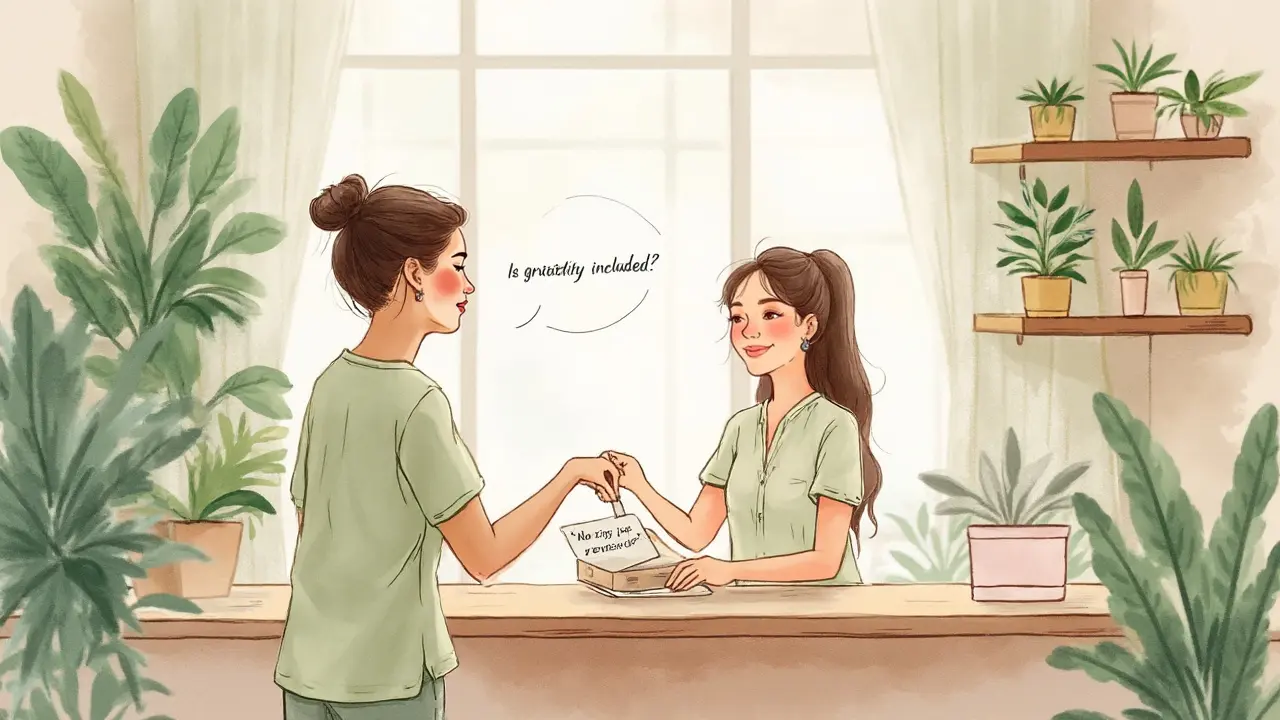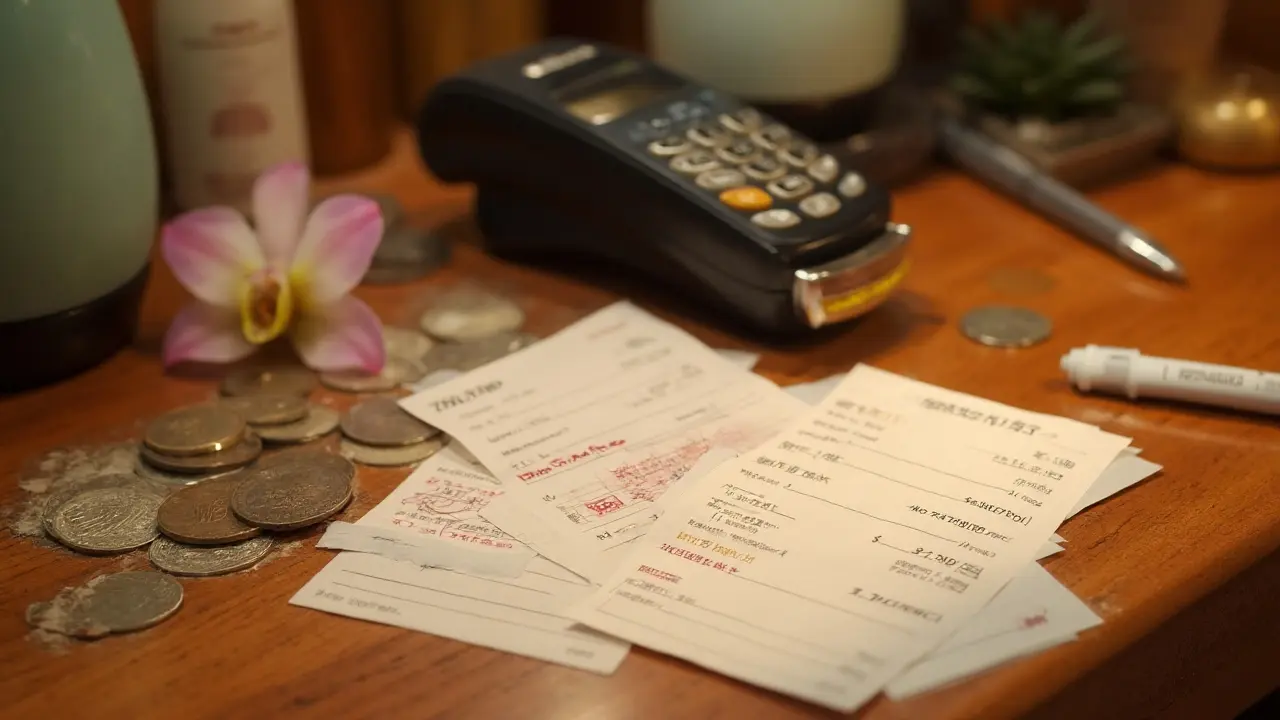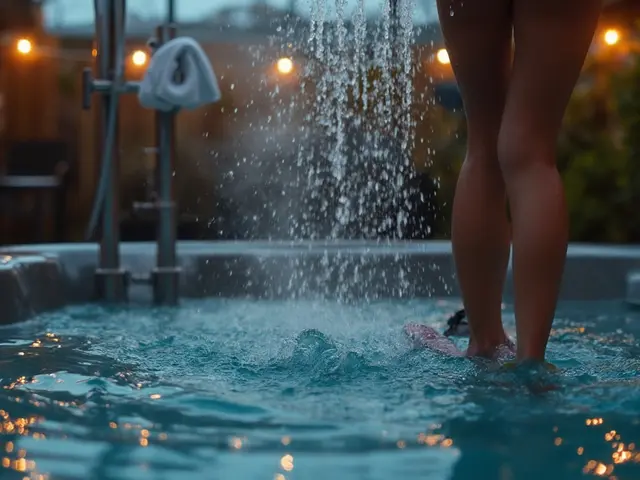You finally booked that massage. You’re blissed out, your shoulders feel human again, and then the bill lands. Do you tip? How much? And will skipping it make you look rude? Short answer: it depends on where you are and the kind of massage you had. I live in Dubai, and I’ll walk you through what’s normal here and abroad so you can relax-no awkward checkout moment, no second-guessing.
TL;DR answer to “Is it rude not to tip for a massage?”
Here’s the quick version you can use right now:
- United States/Canada: Yes, not tipping is usually seen as rude. Standard is 15-20% for spa or mobile massage.
- Dubai/UAE: Not mandatory, but common. 10-15% or AED 20-40 for a 60-min standard massage. If a hotel spa adds a service charge, tipping becomes optional.
- UK/Western Europe: Discretionary. Rounding up or 5-10% if service was great is typical; service is often included.
- Australia/NZ: Not expected. Tip 10% only for exceptional service or upscale hotel spas.
- Japan/South Korea: Don’t tip. It can feel awkward. A sincere thank-you or a small, wrapped gift is better if you must.
- Thailand/SE Asia resorts: Small tips are common. Think THB 100-200 in Thailand, IDR 20k-50k in Bali for good service.
- Medical/clinical massage (physiotherapy, rehab): No tip. Follow clinic policy.
Direct answer: It isn’t inherently rude not to tip for a massage. It’s about local norms and the setting. In places where tipping is customary (like the U.S.), not tipping will likely read as rude. In Dubai and much of Europe, tipping is appreciated but optional-especially if a service charge is included.
One rule of thumb that works almost anywhere: check the bill for a service charge; if it’s there, consider your job done unless the therapist went above and beyond and you want to add a small cash thank-you.
How to decide if you should tip (and how much): a simple playbook
Think of this as your calm, two-minute decision tree before you tap your card.
- Check the country norm first.
- Customary (e.g., U.S., parts of Canada, Mexico resorts): Tip 15-20%.
- Discretionary (e.g., UAE, UK, much of Europe, Australia): 0-10% depending on experience.
- Not customary (e.g., Japan, South Korea): Don’t tip.
- Look at the venue type.
- Hotel spa: Prices are higher and service charges are common. If a 10-12% service charge is on the bill, a tip is optional.
- Independent spa or home studio: In tip-friendly countries, tipping is standard. In discretionary countries, a small cash tip is a nice touch.
- Medical clinic/physio: No tips. If unsure, ask reception, “Do you accept gratuities?”
- Scan the bill for fees.
- Dubai note: You’ll often see 5% VAT and sometimes a service charge in hotel venues. If you see a service charge, you can skip tipping or add a small extra if service was exceptional.
- U.S. note: If “gratuity” is already added for groups or packages, you’re covered.
- Adjust for what actually happened.
- Excellent service or a therapist who solved a real issue? Tip at the top of the range where custom exists.
- Average service? Standard range (or none in non-tipping cultures).
- Subpar or boundary issues? Don’t tip and give calm, specific feedback to the manager.
- Choose the cleanest way to tip.
- Cash is best if you want to be sure the therapist gets it. Hand it discreetly or use an envelope at the desk.
- Card tips are fine if the venue passes them through. You can ask: “Do card tips go directly to therapists?”
- Gifts: Nice, but money is simpler unless you’re in a country where tipping is not done.
If you only remember one line, make it this: match the local norm and the venue style, then fine-tune for the quality you received. That’s tipping etiquette massage in one sentence.

Dubai and beyond: real-world examples, amounts, and cultural norms
I’m based in Dubai, where tipping is appreciated but not a rule. In hotel spas, you’ll often see VAT and sometimes a service charge on the receipt. When I spot a service charge, I don’t feel pressured to add more unless the therapist truly went the extra mile. At independent spas or mall wellness centers, people commonly leave AED 20-40 for a 60-minute session, or AED 50-100 for exceptional service at luxury spots. No one will glare at you if you don’t tip-gracious thanks still go a long way here.
Outside the UAE, the vibe changes by country. In the U.S., tipping is baked into spa culture, and many therapists rely on it as part of their income. In the UK and much of Europe, staff wages tend to be higher relative to tipping cultures, and service may be “included.” Australia and New Zealand lean toward no tipping. Japan and South Korea prefer none; an envelope with cash can confuse or embarrass. In Southeast Asia, modest cash tips are warmly received in resort or tourist areas.
Use this table as a practical map. It’s not about hard rules; it’s your starting point. When in doubt, ask at reception with a smile: “What’s customary here?”
| Location | Customary? | Suggested Amount | Good To Know |
|---|---|---|---|
| Dubai / UAE | Optional | 10-15% or AED 20-40 for 60 min; AED 50-100 at luxury spas if exceptional | Hotel bills may include service charge + VAT. Tipping becomes optional when you see it. |
| United States | Expected | 15-20% of service price; higher for outstanding work | Card tips common; ask if tips go directly to therapists. |
| Canada | Expected | 15-20% | Similar to U.S.; some venues pre-add gratuity for groups. |
| United Kingdom | Discretionary | £5-£10 or up to 10% for great service | Service may be included at upscale venues. Ask if unsure. |
| Western Europe (France, Germany, Spain, Italy) | Discretionary | Round up or €5-€10 if you were impressed | “Service compris” often means staff wages include service. |
| Nordics (Sweden, Norway, Denmark, Finland) | Rare | Not expected; small rounding is fine | High wages; tipping culture is minimal. |
| Australia / New Zealand | Not expected | 0-10% only if exceptional | Most locals don’t tip; hotel spas may be an exception. |
| Japan | No | Do not tip | A heartfelt thank-you is best; tipping can be awkward. |
| South Korea | No | Do not tip | Some international hotels accept tips, but locals usually don’t. |
| Thailand | Common (tourist areas) | THB 100-200 for standard spa sessions | Cash is easiest; hand it discreetly or leave at the counter. |
| Indonesia (Bali) | Common (tourist areas) | IDR 20,000-50,000 depending on venue | Many resorts pool tips; ask if you want to tip a specific therapist. |
| Singapore / Hong Kong | Discretionary | 5-10% or a small flat amount | Service charges are frequent in hotels; cash direct tips are appreciated. |
| Mexico & Caribbean Resorts | Expected (resorts) | 10-15% or USD 5-20 depending on duration | All-inclusive may include gratuities; exceptional service often gets extra. |
Script you can use at checkout if you’re unsure: “Is tipping customary here, and if so, what’s typical?” It’s polite, direct, and saves you guessing.
What about currency? In Dubai, tip in AED. In tourist hotspots, small USD notes sometimes work, but local currency is always smoother.
Quick checklist, rules of thumb, and pro tips
Don’t want to overthink it? Use this cheat-sheet.
- Check the bill first. If you see a service charge, you can skip tipping or add a small extra for standout service.
- Match the country norm. U.S. and Canada? Tip. Japan? Don’t. UAE/Europe? Your call.
- Use cash for clarity. If you want to be 100% sure your therapist receives it, hand cash discreetly.
- Tip on the service price you paid. If you used a promo or package, tipping on the discounted price is fine unless a local norm says otherwise.
- Be specific with praise. A short note or telling the manager by name helps the therapist just as much as money in some venues.
Special cases and how to handle them:
- Couples massage: Tip the same way you would solo. If two therapists worked, split the tip or ask the desk to divide it evenly.
- Mobile/home service: In tip-friendly countries, 15-20% is normal. In Dubai, a flat AED 20-40 is kind; more for detailed bodywork.
- Memberships and prepaid packages: If tipping is customary where you are, tip per session rather than in bulk.
- Short add-ons (scalp, foot scrub): A small extra (e.g., AED 10-20 in Dubai, $5 in the U.S.) feels right if it took extra effort.
- Bad massage or crossed boundaries: Don’t tip. Speak to the manager privately. If something felt unsafe, ask for a different therapist or a refund.
How to say it without awkwardness:
- “Can I leave a tip for Maria directly?”
- “Do card tips go to the therapist or the pool?”
- “I loved the focus on my neck-thank you. I’d like to leave something for you.”
Etiquette extras for Dubai:
- Ramadan: Spas operate with quieter vibes. Tipping norms don’t change-be discreet and respectful.
- Privacy: Many spas hand you an envelope at checkout. If they don’t, a folded note and a smile is perfect.
- Language: A simple “shukran” (thank you) plus eye contact lands warmly.

FAQ: common tipping questions you probably have
Here are the quick answers to the things people ask most after a massage.
Is it rude not to tip if my spa adds a 10% service charge?
Not rude. That service charge is meant to cover service. If your therapist was exceptional, feel free to add a small extra, but you don’t have to.
Does the service charge reach the therapist?
Policies vary. Some venues distribute it to staff; others keep part of it. It’s okay to ask, “Do service charges go to therapists, or is a separate tip better?”
Should I tip before or after the massage?
After. Tipping after lets you match what you give to the quality you received.
What if the massage was disappointing?
Don’t tip. Give concise feedback: what hurt, what didn’t work, and what you expected. Managers usually want a chance to make it right.
Is it okay to tip by card?
Yes, if the venue allows it. If you want the therapist to receive the full amount, cash is safer.
Do I tip for medical or sports therapy?
No, not typically. Clinics and licensed physio practices often have no-tipping policies. If you want to show appreciation, a thank-you card is great.
How much should I tip on a discounted session?
In tip-friendly countries, tipping on the price paid is standard. If you got an extreme discount and the therapist still delivered, you can tip a bit more if you like.
Can I tip in foreign currency?
Try to tip in local currency. In Dubai, AED is best. In tourist spots, small USD bills may be accepted but can create hassles for staff.
What about apprentices or trainees?
If tipping is customary where you are, you can tip them too. Many work hard under supervision and appreciate the encouragement.
Do I need to tip if the owner did my massage?
If tipping is customary in your country, a modest tip or a glowing review is a nice way to support an owner-therapist. If it’s not a tipping culture, a review and referrals are perfect.
Is a thank-you note or review as good as a tip?
In non-tipping cultures-yes. In tipping cultures-add the tip if you can, and then leave that five-star review so others find them too.
Next steps if you still feel unsure:
- Ask reception quietly, “What’s customary here?”
- Set aside a small cash amount before you go so you’re not scrambling.
- Decide your ceiling. For example, “I’ll do 10-15% unless the bill has a service charge.”
- If you want to support a therapist long-term, request them by name next time and mention what you liked. That helps their bookings more than a one-off big tip.
Final thought: tipping is a language. In some places, it says “thank you.” In others, it says “I don’t know the culture.” Match the local accent, and you’ll always sound polite.







September 8, 2025 AT 13:38
Tipping, like any social custom, is a silent contract between traveller and host. When you step into a spa, you step into a micro‑economy shaped by history, labor laws, and unspoken expectations. In North America the practice has become a de‑facto wage supplement, especially for those whose base pay rests below a living minimum. Across the Gulf, the service charge on the receipt already acknowledges the labour, leaving the tip as a token of personal gratitude. Europe, with its higher statutory wages, treats the tip more as a rounding‑up gesture than a necessity. Japan and South Korea, by contrast, view money after a service as an intrusion that could imply disrespect. The underlying philosophical question, then, is whether you are paying for the service itself or for the recognition of the provider’s craft. If the answer leans toward the latter, a small, discrete envelope becomes a sign of respect rather than an economic requirement. If the answer leans toward the former, the receipt’s line items already settle the debt and the tip becomes optional. One can also consider the therapist’s perspective: does a tip elevate their professional dignity or simply pad a low wage? In many spas, tips are pooled and distributed, thereby blurring the direct connection between gratitude and reward. This structural fact means that the act of tipping can sometimes feel like a symbolic gesture rather than a tangible benefit. Yet symbols matter; a sincere thank‑you paired with a modest tip can reinforce a positive feedback loop for future service quality. Conversely, a missing tip in a culture that expects one can be interpreted as a subtle rebuke. Therefore, the safest compass is to read the bill, observe the local custom, and let your own sense of fairness guide the final gesture. In practice, a quick mental checklist-service charge present? local norm? therapist’s effort?-will keep you from awkward moments at checkout.